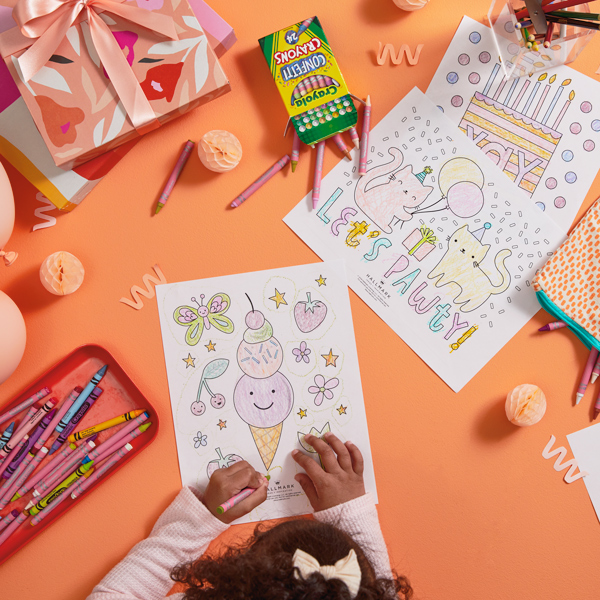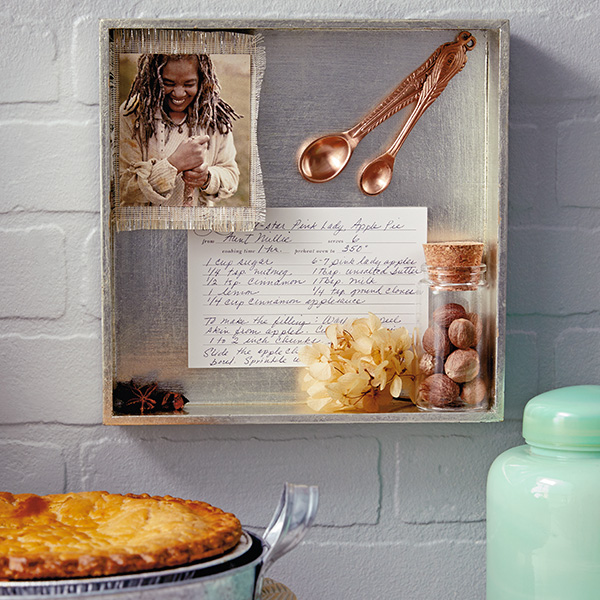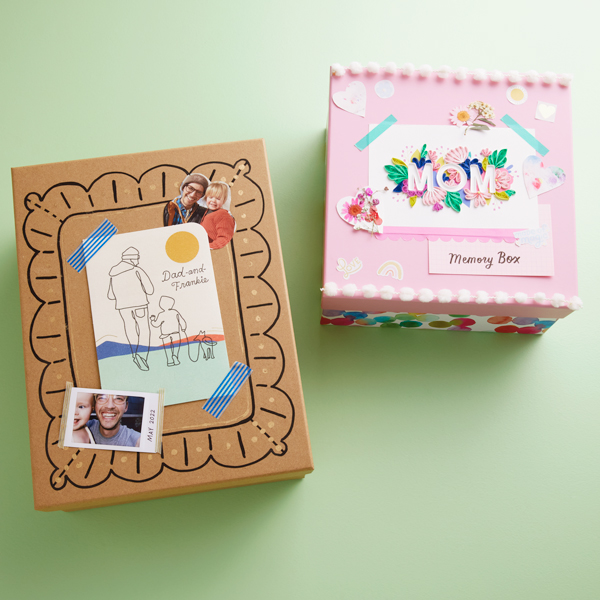Comforting Words: What to Say and Do in Tough Times

When someone we know suffers a loss or is going through a difficult situation, we’re often not sure what to say. Sometimes we ramble or, worse, say nothing and avoid the person. But that doesn’t help at all, and it leaves us dragging around a ton of guilt…and possibly isolating someone we love.
So, how do we show we care? While every heartache is unique to the person going through it, there are universal emotions many of us experience during times of grief and loss. Especially when those we care about are hurting, genuine empathy can guide our words and actions: Try thoughtfully considering what kindnesses would speak to you if you were in a similar situation.
Here are some examples of comforting words to think about the next time you’re struggling with how to help someone going through tough times.
Inspired? Create and share by tagging @Hallmark.
Someone you love is struggling with addiction.
TRY THIS: “I want you to know I’m in this with you. We’re going to fight this together.” Maybe your friend’s child is the one suffering or being treated at a rehabilitation center: You might say, “I care about you and am here to listen if you need to talk.” One more thing—addiction is a sensitive topic. So keeping your conversations confidential will show your friend you respect their privacy and will give them reassurance to express their feelings freely.
AVOID THIS: Offering specific advice. Unless you’re sitting in a counselor’s office and you’re the counselor, kindly keep your opinions to yourself. A few other no-nos:
“Have you tried quitting cold turkey?” or “Just put your mind to it. That’s what I did when I gave up chocolate.” It’s very rare that comparisons from your personal experience will help, especially with something as serious as addiction. One way to look at it: Think about something you love that would be really hard to give up. Then, multiply it by 1,000. Then, consider this battle a matter of life and death. That’s a small glimpse of the pain of addiction.
SHOW YOU CARE: Visit your friend whenever possible or appropriate. Or offer to drive them to the rehab facility to see their child. If they’d like, wait in the lobby as an extra force of support. Take them to lunch afterward or send them home with a care package of comforting things: a cozy throw, a super huggable stuffed animal, some chamomile tea.
Your friend is suffering from mental health issues.
TRY THIS: “You are very important to me and nothing will ever change that.” Or “You’re a wonderful person and I wish I could take away this pain from your heart.” Or simply, “Can I give you a hug?” These quotes also work for a parent of someone struggling with depression, bipolar disorder, or another mental health challenge. Many moms and dads feel ostracized in what is oftentimes a lifelong battle, and saying something kind can make a huge difference.
AVOID THIS: “Are you off your meds again?” Or “Cheer up! The sun’s out!” Or “I don’t understand why you can’t just snap out of it.” Let’s pause and remember that a mental health diagnosis is a medical struggle, not just a little bit of sadness or eccentric behavior. This is a time to practice being judgment-free and accepting of each other.
SHOW YOU CARE: Take your friend out for coffee or drive an exhausted parent to visit their child at a mental health center. Be present for someone who most likely feels very alone. One more tip: Do the conscientious thing when talking to a parent with a troubled child. If you have the perfect kid, avoid humble bragging in front of them. It can feel heartbreaking for a parent whose child may never get better.
Your sister just got a worrying diagnosis for her child.
TRY THIS: “I’m so sorry. I want to be here for you, in whatever way helps you the best.” You could even say, “I’m going to be checking on you more,” then commit to calling or making plans with her on a regular basis.
AVOID THIS: “They’re going to be okay.” Or “My friend’s son got the same thing and he’s totally fine now.” Sadly, as much as we want to predict a happy prognosis, it’s out of our control. Instead, keep that hope inside your heart and your caring will shine through.
SHOW YOU CARE: Drop off some groceries at their front door or order pizza and get it delivered. Pull in their garbage cans on trash day. Send a gift to the family, like movie passes or bring a special treat for the children. Any little thing that can lighten their burden will be much appreciated.
Your brother is going through problems with his adult child.
TRY THIS: “I’m so sorry. It’s really unfair your family is going through so much stress.” When grown up kids are suffering, it’s a very troublesome kind of heartache. Approach your loved ones with gentleness and maybe some extra assurance, “I will always love you and your family.”
AVOID THIS: “They’re too old to be acting like that.” Or “Your kid needs to straighten up!” Or “You should just cut them off.” Tough-love statements aren’t very helpful and can add extra anxiety. You may have excellent points, but someone once said it’s better to be kind than to be right. (And we agree.)
SHOW YOU CARE: Listen carefully to your family member: what they’re saying and what they’re not saying. Just having someone to vent to may be enough. But if you want to go the extra mile, bring over their kid’s favorite childhood meal or dessert. A little reminder of good times might bring some much-needed hope.
Your best friend is moving their dad to an assisted living home.
TRY THIS: “I know this is very difficult for you. How have you been doing?” Let your friend let off some steam—they may have been waiting for this moment to unload everything on their mind.
AVOID THIS: “Why are you so worried? They’ll be well taken care of.” Or “Why don’t you get your siblings to help you more?” From the emotional toil to the financial burden to the frustrations of the parent-child relationship, caring for an aging mother or father is no easy task. Our gift to our friends is to not add an extra layer of complication.
SHOW YOU CARE: A thoughtful note can work wonders when someone is stretched thin, depleted, and sad to see their parent’s declining health. If your friend likes company, offer to run errands with them or take them to a lighthearted movie to get their mind off things for a few hours.
One of your friends is diagnosed with a terminal illness.
TRY THIS: “You’re my friend and I want you to feel supported and loved.” Or “For future reference, I never get tired of giving out hugs, okay?”
AVOID: “I’m going to pray for a miracle.” You can still silently pray for your friend, but your caring presence will make the most difference. Another not-so-helpful response: “Have you tried juicing? I hear it can really turn things around.” In some instances, your friend might like your help researching alternative healing and holistic treatments, but it’s best to follow their lead in this type of discussion.
SHOW YOU CARE: Your friend will need different things at different times, from support during the initial shock to shopping for a nourishing diet to getting dog-walking help on days she feels weak. Get the squad together and brainstorm ways you can help as a group. Maybe you make a rotating schedule of who sits with her at treatments. Maybe it’s a standing date with the girls. Maybe she wants to put together a memory book for her family…and you offer to help.
Your friend recently suffered a miscarriage.
TRY THIS: “I’m so, so sorry. Thank you for telling me. Would you like to come over for some coffee sometime and talk about it?” Or “My heart breaks for you. I know having a baby means the world to you.”
DON’T SAY: “You’ll get pregnant again…you just wait!” Or “Have you thought about adoption?” Or “At least you already have two kids.” Losing a baby creates a deep, aching wound that is often grieved in silence. Try not to fix this for your friend. Just let her cry…just hold her hand.
SHOW YOU CARE: Make a basket of goodies. Here are a few ideas to get you started: a blanket, teas, an oversized mug, her favorite candy, a pedicure gift card. If you’re a cook, bake her a warm dish to enjoy—or bring in sandwiches if you’re more of a takeout girl or guy.
A colleague is going through an extremely stressful time.
TRY THIS: “I wish I had a magic wand to make all of this stress go away. But I do have time to listen.” Or “I know you’re carrying a huge burden right now. I would like to drop off dinner to your house one night.” Or “Mind if I drive you to your appointment? We can grab a chai afterward.”
AVOID THIS: “It could be a whole lot worse.” Or “When I’m stressed, I just get my hubby to rub my back.” Note: Your friend may not have anyone to lean on. That’s why the weight of the world might be so heavy. It’s best not to emphasize that point even more.
SHOW YOU CARE: Offer to drive your friend to the airport, to their car dealership for an all-day repair (so they don’t have to sit forever), or help with another overwhelming errand or task. Get them a chair massage gift card or leave a warm breakfast pastry on their desk. Sometimes it’s the smallest things that really bring light to a dark time.
One of your friends just lost their pet.
TRY THIS: “Losing a pet is so very difficult. They’re family and they’ll always be in our hearts.” Or “I’m so sorry. You two were the perfect pair. I know you loved each other very much.” Or “You gave Sonny a wonderful life and he gave you so much joy. I always liked hearing your stories about his antics and hope you continue to keep telling them.”
AVOID THIS: Comments that downplay the grief. “At least your cat lived a long time.” Or “I think you should get a new puppy!” Or “Oh, really? That sucks.” Fur family is family and being sensitive to that will bring comfort to a very sad time.
SHOW YOU CARE: Find a cute pic on Instagram of your friend’s fur baby and put it in a frame for their desk. Write down one of your favorite anecdotes of their beloved pet. Get a personalized stepping-stone with the sweet pet’s name, and as a bonus, bring a plant that can be added to the garden in their memory.
A friend is going through a messy breakup.
TRY THIS: “Even though things are rough right now, I want you to know you’re a great guy and your friends care about you.” Or “It’s painful for a relationship to end. We want you to know we’ve got your back.”
AVOID THIS: “You’re too good for them anyway.” Or “I always thought they’d be the type to cheat.” Focus your efforts on supporting your friend in a positive way, not cutting down their ex. A good thing to remember: Leave the venting to your friend…they’ll probably be fine taking on that role.
SHOW YOU CARE: Invite your friend to see some live music. Or maybe help them pack up belongings that trigger unwelcoming memories. You could even bring over a pizza and binge watch a thriller or comedy series. They’ll probably like the company more than they know.
Shop Sympathy
See allYou may also like
See more-
Birthday Free birthday coloring pages to add more fun to the celebration
The best birthdays are the ones filled with lots of little treats and fun activities, from sunup to sundown. If you’r...
-
Family Tips and ideas for preserving and displaying family recipes
Family recipes are a special kind of priceless heirloom—the kind that transport us back to our favorite times with ou...
-
Mother's Day Meaningful, personal Mother's Day gift ideas for every mom you know
It can be tough to come up with gift ideas for Mom. Most of us want to give her something meaningful: a gift that sho...
-
Father's Day Celebrating two dads on Father's Day: Tips and ideas inspired by real families
As a dad, I appreciate Father’s Day. Even though my family has never made a really big deal out of it, it’s always so...
-
Thank You 100+ teacher appreciation gift ideas to say “thanks for all you do!”
In 6th grade, my homeroom teacher made us illustrated, laminated bookmarks—each one a custom collage of our interests...
-
Christmas Dr. Finkelstein’s Lab Tree Topper
Fans of Disney Tim Burton’s The Nightmare Before Christmas, we have a frightfully fun new addition for your tree! Kee...
-
Graduation Graduation gift ideas for every level of education
My little brother starts kindergarten this year, and I’m already bracing myself for the tears—mine, not his. I know t...
-
Lifestyle Free printable When Calls the Heart Bingo card to celebrate the Season 11 premiere!
Who's ready for a Heartie Party? You know we are! So much so, we created a bingo card to add a whole extra layer of f...
-
Christmas Star Wars: A New Hope™️ Collection
You don’t have to travel to a galaxy far, far away to experience an epic adventure! Each stocking holder performs sce...
-
Christmas Wreath of Memories Keepsake Ornament
Get a special behind-the-scenes look at how Keepsake Artists Gregor Benedetti and Rob Stanphill collaborated on the d...
-
Christmas Howliday Helpers First in Series Keepsake Ornament
Do you want the inside scoop on an im-paws-ibly cute new series? We’ll throw you a bone—Keepsake Artist Sharon Visker...
-
Christmas Keepsake Ornaments ShowToppers Mini Collection
We’re so excited to introduce our new ShowToppers collection. Featuring three unique designs, each tree topper is int...
-
Christmas Keepsake Ornaments North Pole Village Table Decoration
Keepsake Artist Sharon Visker is here with a special delivery of Christmas magic! Hear how she brought this bustling ...
-
Christmas Harry Potter and the Chamber of Secrets™️ Storytellers Collection
Ready for a little magic? Featuring light, sound and real dialogue from the movie, Harry, Dobby, Ron, Hermione and th...
-
Christmas Disney The Haunted Mansion Collection
Welcome, foolish mortals, to the Haunted Mansion! Featuring interactive light, music and dialogue from the classic Di...
-
Christmas The Grinch Wreath
This amazing motion-activated wreath may not steal Christmas, but it’ll definitely steal the show! Complete with ligh...
-
Christmas Twelve Days of Christmas First in Series Keepsake Ornament
Watch as Keepsake Artist Gregor Benedetti and Senior Design Technician R.J. Stebbins collaborate on the first ornamen...
-
Christmas Christmas Is… First in Series Keepsake Ornament
Keepsake Artist Tim Bishop didn’t have to go too far to find inspiration for his first Keepsake Ornament series. Duri...
-
Christmas Cup of Cozy First in Series Keepsake Ornament
Sugar and spice and everything nice, that’s what the new Cup of Cozy series is made of! Hear how Keepsake Artist Iman...
-
Arts, Crafts & DIY 9 DIY memory box ideas to keep special days close at heart
Every incredible trip, amazing party and huge milestone comes with its own unique memories and little objects worth h...





















